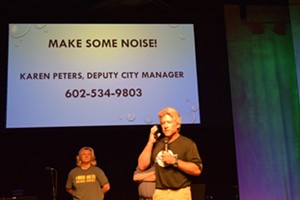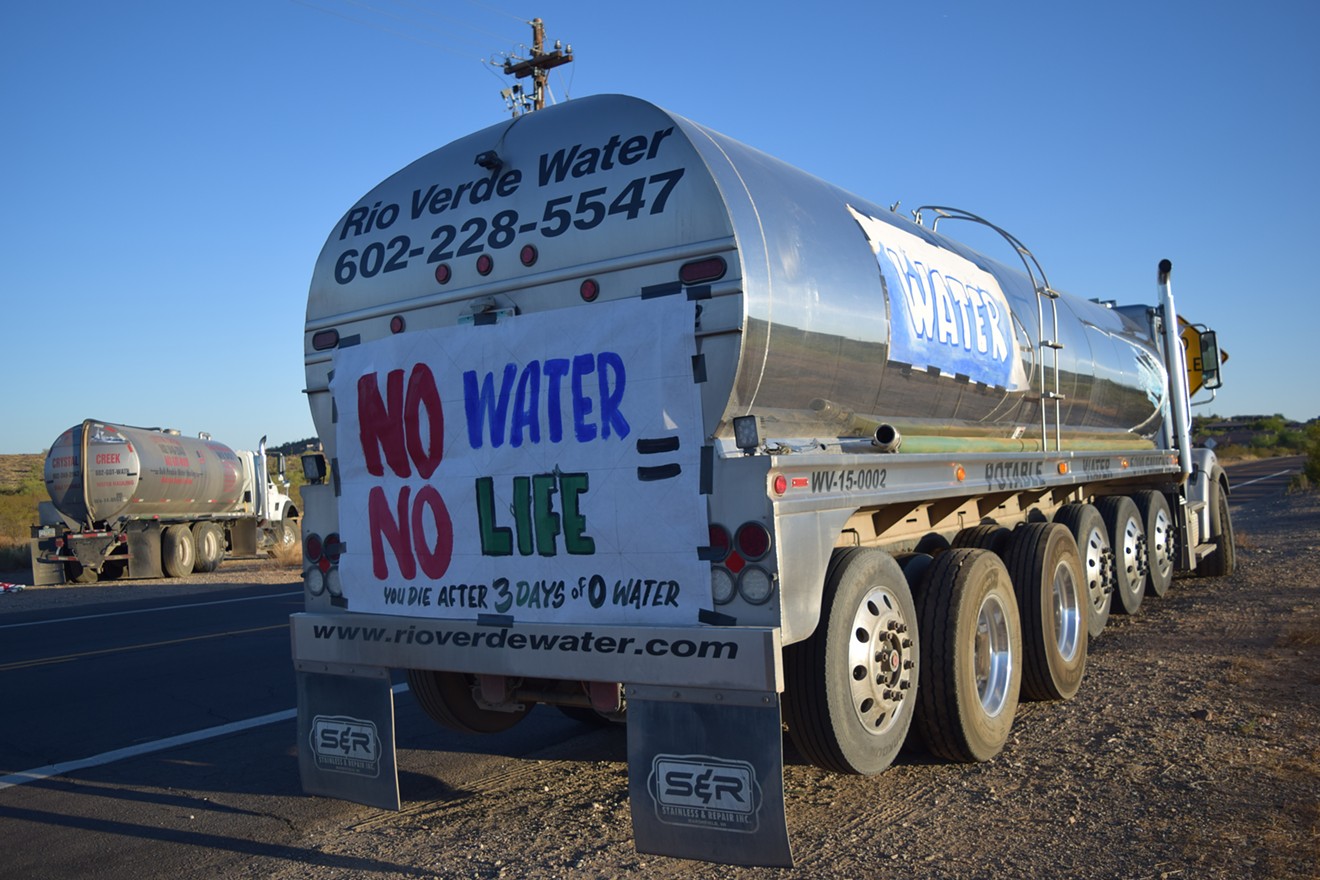Hornewer has a shock of grey hair and was wearing a T-shirt with the logo of his company, Rio Verde Water Hauling. A microphone in one hand, with the other he punched in the number of Karen Peters, a Phoenix deputy city manager.
“I want her to hear the human beings that she’s affecting,” Hornewer said. “Because it’s really easy as a public official to hide behind a closed door.”
“We’re going to kick that door down,” he added.
The call went to voicemail; it was a Sunday. At the tone, please record your message.
Hornewer introduced himself. “Again, I’m reaching out to you to bring you to the negotiation table, but this time’s a little bit different,” he said. “This time, I have a few people behind me that would like to say something.”
He held his phone up to the crowd. Several hundred people in the church cheered, clapped, and chanted: “NO WATER, NO LIFE.”
At this church in the north Phoenix community of Desert Hills, residents had turned out to hear water-truck company owners and residents decry a recent decision by the city of Phoenix. A pair of water trucks with banners draped on them were parked at the end of the church driveway, like two steel sentinels.
Water-hauling trucks in Desert Hills and New River will not be allowed to fill their vehicles at Phoenix fire hydrants after December 31, jeopardizing their ability to serve residents in these unincorporated communities, which rely on either private wells or water trucks.
Residents are frustrated and alarmed; after all, the clock is ticking. It’s unclear what many of the area’s roughly 15,000 residents will do for water if an agreement or stopgap measure isn’t reached before the end of the year.

John Hornewer, the owner of Rio Verde Water Hauling, leaves a voicemail for a Phoenix deputy city manager on stage in front of hundreds of New River and Desert Hills residents.
Joseph Flaherty
Water quality is also an area of concern for the city. Although hydrant water is potable, Phoenix can’t guarantee the water is safe for consumption once it leaves the pump and enters a truck.
Phoenix’s Water Services Department wrote in a statement that water haulers will still be able to serve these communities after December 31.
“Alternative water supplies outside of Phoenix are currently available,” the statement said. “In fact, many — if not all — of the water haulers are already customers of established tanker filling stations elsewhere in the Valley that were specifically built for water hauling.”
But a loose collective of organizers and water truck company owners are working feverishly to raise awareness of the issue before the deadline. There’s talk of a filing an injunction in court, or forming a nonprofit to better handle fundraising. But much of the organizing is clearly happening on-the-fly.
More than 2,440 people have signed an online petition. Keith Turner, one of the “No Water, No Life” committee members, said they’ve also collected a couple thousand signatures on paper. Residents are alarmed at the prospect of no water, and irate about paying much higher prices for the same service if companies are forced to truck water from Peoria or Scottsdale instead.
“We’re scared. We’re terrified,” said Turner, a detective for the Department of Liquor. A New River resident of 12 years, Turner and his family rely strictly on hauled water, despite spending $30,000 to dig and then deepen a well on their property. It went dry four years ago.
“You really have a split in the community,” he told New Times — people who don’t depend on water haulers are less inclined to put pressure on Phoenix.
“The attitude obviously is, ‘Well, somebody else will do it. Our water’s working fine.’ People don’t want to get involved,” Turner said.
Brad Phelps, who owns Crystal Creek Water Hauling, said water prices could more than double if his trucks are cut off from Phoenix hydrants. He fears that other cities such as Peoria or Scottsdale might follow Phoenix’s lead and cut water haulers off from hydrants, too.
But Phelps isn’t optimistic about striking a deal with Phoenix before 2018.
“Unless we get more help from other volunteers that can really put the bug on some people at the City Council, I see them going ahead with what they’re planning on doing,” Phelps said.
The city said water haulers have had "ample time" to find alternatives. Originally, the hydrant permits Phoenix issued to water haulers were temporary and meant for construction, not hauling water to residences. A Water Services Department spokesperson said the city began issuing verbal warnings to companies two years ago, telling them that continued access to hydrants wouldn't be allowed.
Residents are realizing their costs could rise and property values plummet if they can’t access water from the trucks.
Turner said, “We’re just middle-class people, and if [the water price] doubles, it’s really going to hurt.”
Part of the problem is that the local aquifer under New River and Desert Hills can’t keep up with increased demand from lots of new wells. According to the Department of Water Resources, a layer of impermeable bedrock very near the surface limits the amount of water that homeowners can pump.
Melissa Kinnersley has lived in her house in New River for 13 years, but over the last five years, her well has run dry. “It was gradual, and now nothing,” she said.
As a result, Kinnersley has to purchase water from haulers. Her neighbors are moving in the same direction as they watch well levels drop.
“Everybody has the same story, and it just feels like it’s really just a matter of time if you look at the graphs and you look at the levels,” Kinnersley told New Times. “It looks like my story is going to be about everybody’s story — not everybody’s story, but a lot.”
In spite of the aquifer management issues, the crisis is a hard reality of local government: Phoenix owes nothing to people who chose to live beyond the city limits.
According to Kathleen Ferris, a former director of the Department of Water Resources, Phoenix has “some very logical grounds” for ending hydrant access.
“It isn’t their responsibility to make sure that people who are not even in their service area get water,” she said. “It’s their responsibility to serve their citizens and customers.”
Ferris is sympathetic to the homeowners’ situation. Developers are able to skirt regulations that require a sustainable source of drinking water when they build property in lots of five or fewer, she said. It’s possible that residents didn’t anticipate the current crisis when they bought their property.
But in the future, water haulers aren’t going to solve the north Valley’s water woes.
“The bottom line is it’s not a long-term solution for these people,” Ferris said. “What are they going to do, do this for the next 100 years? That groundwater isn’t going to be replenished, so they’ve got to look for a more permanent solution.”












